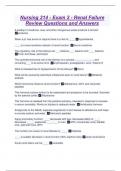Nursing 214 - Exam 2 - Renal Failure
Review Questions and Answers
A buildup of creatinine, urea, and other nitrogenous waste products is termed:
✅azotemia
When a pt. has anuria or oliguria there is a risk for ____ ✅hyperkalemia
____ is a more sensitive indicator of renal function. ✅Serum creatinine
The regulatory role of the kidneys are ___ balance, ___ balance and ____ balance.
✅Fluid, Acid base, electrolyte
The synthetic/hormonal role of the kidneys is to secrete ____, ____, ____ and
converting ___ to its active form. ✅erythropoietin, prostaglandin, renin, Vitamin D
What is released due to hypoperfusion of the kidneys? ✅Renin
What will be caused by electrolyte imbalances seen in renal failure? ✅Metabolic
acidosis
Which hormones influence renal function? ✅Aldosterone, ADH, and natriuretic
peptides
This hormone causes sodium to be reabsorbed and potassium to be excreted. Secreted
by the adrenal cortex ✅Aldosterone
This hormone is released from the posterior pituitary, released in response to increase
in serum osmolality. Works on tubules to reabsorb water. ✅Antidiuretic hormone
Antagonists to the RAAS, suppress angiotensin II and release of aldosterone and helps
to excrete sodium and water. ✅Natriuretic peptides
Aging and kidney function: ____ decreases with age, decreased ability to ____,
decreased _____, weakened ____, ___ in men. ✅GFR, concentrate urine, bladder
tone, sphincter tone, BPH
The number one cause of renal disease is _____ ✅Diabetes
____ is sudden decrease in renal function (50% nephron loss) ✅acute renal failure
Acute renal failure can be ____ ✅reversible
, What are the 3 types of acute renal failure? ✅pre-renal, intra-renal, post-renal
Dehydration and hypovolemia would be considered which type of ARF? ✅pre-renal
Direct damage to kidneys due to toxins such as medications (gentamycin, vancomycin)
dyes, rhabdomyolysis are considered which type of ARF? ✅intra-renal
An obstruction anywhere from the renal pelvis to the urethra such as a due to BPH,
bladder cancer, prostate cancer, urethral stricture or a kidney stone is considered which
type of ARF? ✅post-renal
What are the 4 phases of ARF? ✅Initial, oliguric, diuretic, recovery
In this phase of ARF there is insult or injury. ✅Initial phase
In this phase of ARF there is a reduction in UO, < 400mL, nitrogenous wastes
accumulate causing abnormal labs, there is a fluid volume excess, this phase can last
10-14 days. ✅Oliguric phase
In this phase of ARF blood work starts to normalize, pt. begins to have increased UO,
Lasts 1-3 weeks ✅Diuretic phase
In this phase of ARF the GFR begins to increase; may take up to a year for kidney
function to stabilize. ✅Recovery phase
Assessment of a pt. with ARF: Signs and symptoms of retention of _____ includes,
____, __/__, altered ____, _____ and signs of _____ ✅nitrogenous wastes, anorexia,
N/V, ALOC, pruritus, pericarditis
Pruritus is due to build up of ___ ✅urea
Signs and symptoms of retention of fluid with ARF include ___, signs of ___, decreased
____ ✅edema, HF, UO
Signs and symptoms of inability to regulate electrolytes with ARF include signs of ____
and cardiac _____ ✅acidosis, arrhythmias
Hyperkalemia can cause which arrhythmias? ✅ventricular tachycardia, ventricular
fibrillation
Collaborative care for ARF includes treating _____, management of renal failure and
complications with _____, ____ support. ✅the underlying cause, hemodialysis,
nutritional




